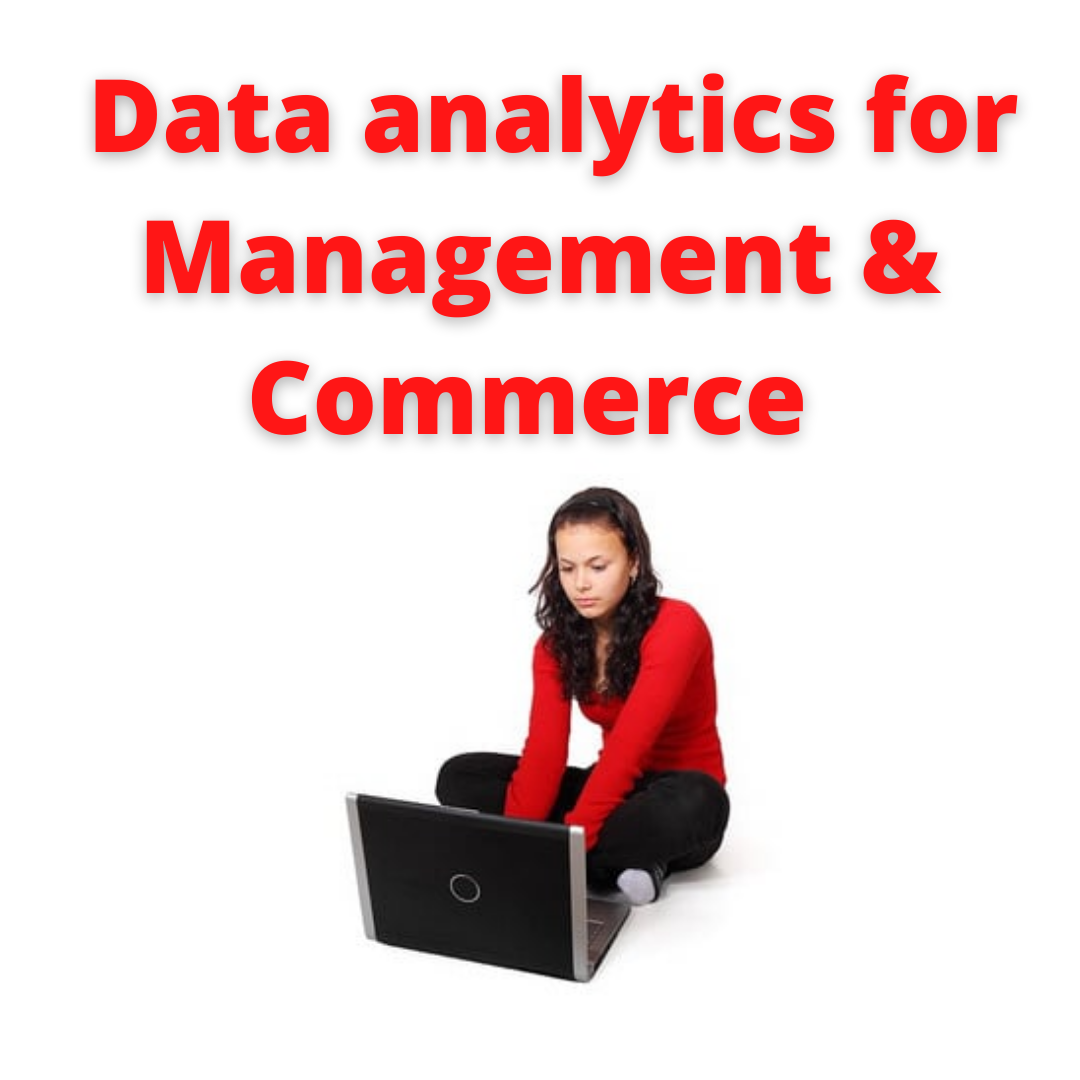Data Analytics for Commerce Students (B.Com/MBA) – Start Here
Yes, commerce students can become Data Analysts. Learn the exact skills, tools, and a step-by-step roadmap to switch from Accounts/Finance/Operations into high-growth analytics roles.
Table of Contents
ToggleYes, commerce students can become Data Analysts. Learn the exact skills, tools, and a step-by-step roadmap to switch from Accounts/Finance/Operations into high-growth analytics roles.

In today’s data-driven economy, data analytics for commerce students has become a pivotal skill that shapes future careers. With businesses relying on data to make informed decisions, commerce graduates equipped with analytics knowledge are in high demand. This section explores why analytics matters, key concepts to master, and actionable steps to get started.
✅ Bottom line: For commerce students, data analytics is a career accelerator. By mastering analytics skills, you can boost decision-making, improve processes, and open doors to high-paying roles in finance, marketing, and management.

Data analytics transforms how businesses make decisions. For management and business students, it unlocks career-ready skills across strategy, finance, marketing, and operations. Here are ten compelling reasons it matters.
Analyze & interpret data to guide strategic choices with confidence.
Map trends, consumer behavior, and competitors to stay ahead.
Spot bottlenecks, streamline processes, and cut costs.
Understand preferences & patterns to tailor products and campaigns.
Use historical data to anticipate risks and reduce uncertainty.
Forecasting, budgeting, KPI tracking for better performance.
Optimize inventory, reduce delays, and improve fulfillment.
Evaluate campaigns, segment audiences, and personalize outreach.
Identify opportunities, validate ideas, and launch data-informed ventures.
Pathways into business analytics, data science, finance, research & consulting.
✅ Bottom line: Mastering analytics helps management & business students drive strategy, efficiency, and growth—while opening doors to high-demand careers.
✅ Yes! Commerce students can absolutely pursue a career in Data Analytics. With the right roadmap — Excel → SQL → Python → BI Tools — you can transition smoothly into this high-growth field.
Absolutely! By learning Excel, SQL, BI tools, and some Python, commerce grads can land analyst roles in finance, sales, and operations.
Commerce students already understand business operations. Adding analytics helps them drive data-driven decisions and become industry-ready.
Yes! Python is beginner-friendly. It helps analyze large datasets, automate reports, and run predictive models.
Definitely. With practice, commerce grads can apply ML for fraud detection, sales forecasting, and customer analytics.
In India, fresh Data Analysts earn ₹3.5–5 LPA, while Data Scientists start around ₹4.5–6 LPA, depending on skills and domain knowledge.
🚀 Bottom line: Commerce students can bridge business + technology by mastering Data Analytics. Start today with Excel & SQL, then grow into Python, BI, and ML — and open the door to high-paying analytics careers.
In today’s job market, skills beat degrees. Data analytics gives students from any stream—Commerce, Management, Arts, or Science— a practical route to high-growth roles through hands-on, job-ready training.
Businesses run on facts, not assumptions. Strategies are now built on engineered, analyzed data—fast.
B.Com, BBA, MBA and non-tech grads are joining analytics successfully—no coding background required to start.
Begin with Excel → SQL → Power BI; add Python and statistics as you grow.
Learning data analytics equips students from any stream with job-ready skills for a data-driven world. Whether you’re a commerce student or a working professional, analytics opens doors to high-impact roles—start now and build a portfolio that gets interviews.
Commerce students can definitely pursue a career in Data Analytics. With consistent learning, you can collect, process, and analyze data to uncover insights that help businesses grow. This is one of the best career shifts for commerce students in today’s tech-driven business world.
✅ Yes! Python is beginner-friendly and a must for analytics. It helps you work with large datasets, run calculations, and build visualizations — making you industry-ready.
Yes! With training, commerce students can apply ML and AI models for business forecasting, fraud detection, and sales insights. These skills are highly valued in the modern job market.
💰 Entry-level Data Scientists in India earn around ₹4.5 LPA (~₹37.5k/month). With 1–3 years of experience, salaries grow rapidly — making it one of the most lucrative careers for commerce grads who transition into analytics.
Popular among data scientists for its libraries NumPy, Pandas, Matplotlib — perfect for cleaning, analyzing, and visualizing data.
Ideal for statistical modeling and data analysis, offering powerful visualization and complex dataset handling.
Converts raw data into charts, graphs & maps. Tools: Power BI, Tableau, Excel.
Automates model building, identifies patterns, and predicts outcomes with minimal human input.
Enhances analytics with AI-powered insights into customer behavior, product strategy & marketing.
The backbone of querying databases. Mastering SELECT, JOIN, GROUP BY is essential for analysts.
Framework for storing, transporting, securing & integrating data — foundation of any analytics strategy.
Accountants with analytics skills are powerful decision-makers. They influence policies, strategies, and drive efficiency by combining financial expertise with data insights.
💰 Entry-level Data Analytics specialists earn £24k–25k. With experience → £30k–35k. Senior specialists cross £60k+.
By merging accounting knowledge with analytics, professionals gain unique recognition and help businesses grow strategically.
Start with Excel (Pivot Tables, LOOKUPs, Power Query) and brush up on basic statistics — mean, variance, correlation. 👉 Build mini dashboards from sales/finance data.
Learn SQL to query databases. Focus on SELECT, JOIN, GROUP BY, and Window functions. 👉 Try case studies like “Top 5 products by sales” or “Customer churn queries.”
Build interactive dashboards for Finance, Sales, Operations. 👉 Example: Create a Profit & Loss dashboard with slicers by region/month.
Learn Python for data cleaning and analysis. Use Pandas, NumPy for datasets, and Matplotlib/Seaborn for visuals. 👉 Example: Analyze sales trends across 3 years.
Understand ML concepts like Regression, Classification, Clustering. 👉 Example: Predict customer churn or sales forecasts.
Build a portfolio with 3–4 projects (Excel dashboard, SQL case study, BI dashboard, Python analysis). 👉 Add them to GitHub/LinkedIn & apply for internships or junior analyst roles.
🚀 Bottom line: With just 6 months of structured learning, commerce students can smoothly transition into Data Analyst roles and build high-paying, future-proof careers.
This summary captures the essential journey and benefits of mastering Data Analytics, turning your commerce degree into a powerful asset in the data-driven economy.
### 1. The Core Value Proposition: Business + DataExisting knowledge of **Finance, P&L, and KPIs**.
Mastering the tools: **Excel, SQL, Power BI, Python**.
High-demand roles, strategic decision-making, high pay.
**Excel & Stats:** Quick reporting and foundational math. *Goal: Business Foundation*
**SQL:** Essential for accessing and manipulating large company data. *Goal: Data Access*
**BI Tools (Power BI/Tableau):** Converting data into executive dashboards. *Goal: Communication*
**Python Basics:** For advanced analysis, cleaning, and automation. *Goal: Automation*
**ML Concepts:** Using simple models for forecasting and prediction. *Goal: Prediction*
**Portfolio:** Building 3-4 projects on GitHub/LinkedIn. *Goal: Proof & Interviews*
Yes. Your finance/accounts/operations background is a domain advantage. Start with Excel → SQL → Power BI; add Python when comfortable.
Absolutely. Follow a 6-month path: Excel & stats → SQL → BI dashboards → Python basics → ML intro → portfolio + internship.
A job-oriented Data Analyst program (Excel, SQL, Power BI/Tableau, case studies). Choose Data Science later if you want Python/ML depth.
Excel + SQL + Power BI is the fastest route to entry-level analyst roles; add Python for growth.
Excel, SQL, BI dashboards, basic statistics, domain knowledge (finance/sales/ops), and communication/storytelling.
With consistent effort, 4–6 months is realistic for a portfolio and junior roles.
Typically ₹3.5–5 LPA for Data Analyst roles; Data Scientist entry levels often start around ₹4.5–6 LPA depending on skills/location.
Analyst = Excel/SQL/BI, business reporting & insights (best to start). Scientist = Python/ML, deeper modeling; move here after analyst foundations.
Whether you’re a commerce student starting your journey or aiming for advanced roles, Vista Academy has guides and courses to help you grow. Check out these resources 👇
Enroll in our Data Analyst Course for Commerce Students and learn Excel, SQL, Power BI, and real-world projects.
Curious about pay? Read our Data Analyst Salary in India report to know entry-level and senior earnings.
Want a structured plan? Check our 10 Steps to Become a Data Analyst guide with practical checkpoints.
Start coding with our Python for Data Analytics guide and learn Pandas, NumPy, and visualization.
Thinking ahead? Explore our Ultimate Data Science Career Guide for advanced roles and skills.
